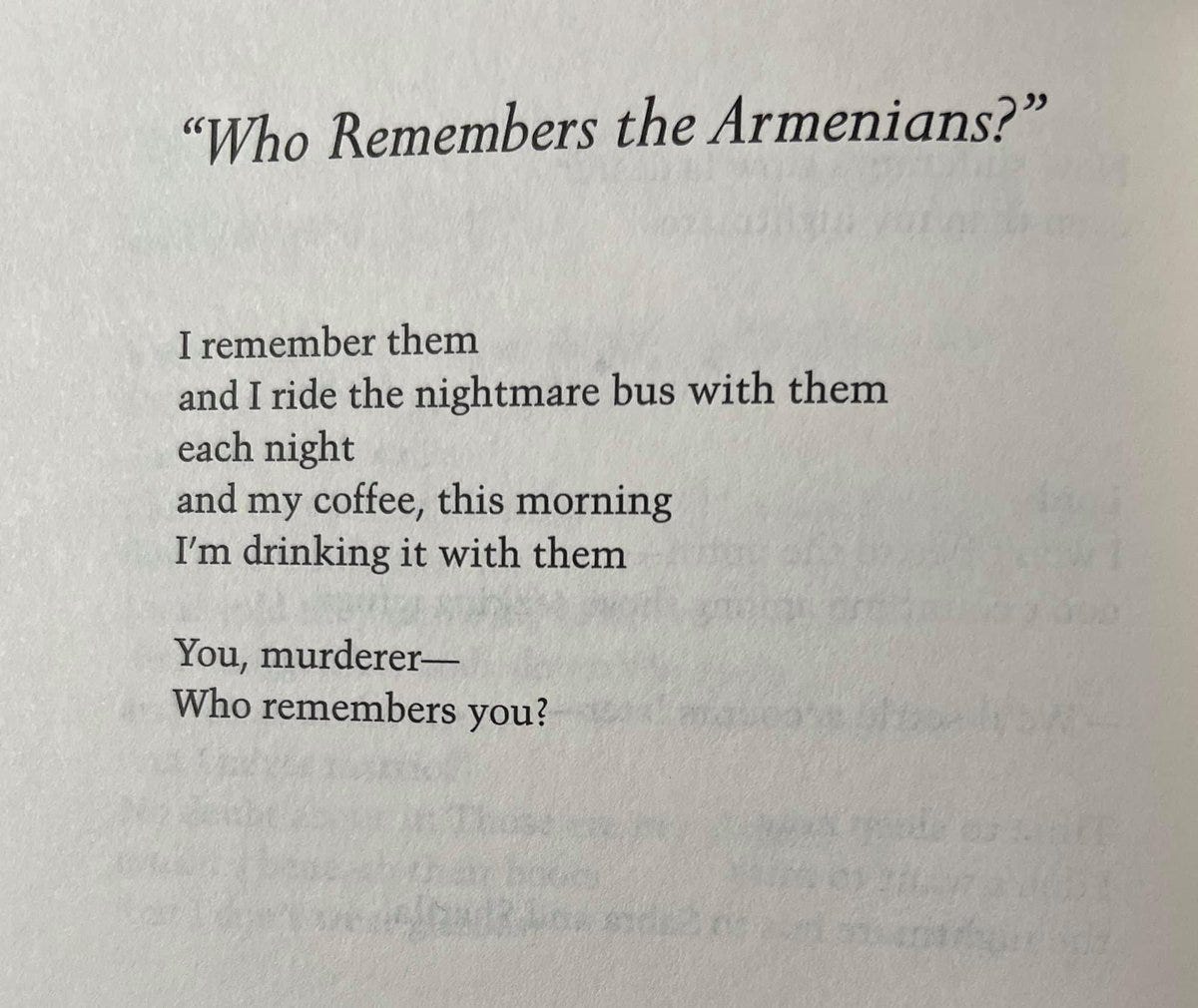#126 - Moments of Radicalization
or: so what exactly ARE democratic governments if not a representation of the will of their people?

Hey there. Hi. It’s been a while.
The world has changed since my last ‘stack went out.
Millions of people have poured onto the streets, openly defying their governments’ actions. Begging for a ceasefire. Pleading for humanity.
It feels like every Elected Representative in America has forgotten the second half of their title. Representative. Of their constituents. These people are supposed to be Public Servants. They are supposed to listen to what the people of their districts want. We, the people, are supposed to be the guiding metric of the votes they cast.
I’ve been thinking a lot about history. When it starts. How we’re taught it. The way that memorizing a bunch of disparate events and focusing so hard on one historical event/time period without connecting it to the modern day is maybe why so few people have an understanding of how we arrived here.
The first person who taught me the etymology of the word Genocide was one of my best friends in high school. She had immigrated from Armenia in the third grade, and when we were in high school she petitioned to expand the Holocaust Studies class to Genocide Studies.
Armenians had been increasingly persecuted within the Ottoman Empire throughout the 1890s, but when World War I was in full swing, the Turkish leaders of the Empire systemically massacred Armenians. There were public executions of scholars, terror raids, and death marches through the desert. By the end of their genocidal campaign, over 1.2 million Armenians had died.
My friend petitioned because she felt that understanding a broader scope and the architecture of more than one instance of genocide allowed for a deeper understanding of the escalation, the dehumanization tactics, and the continued ramifications across all instances of targeted ethnic cleansing.
The Armenian Genocide is not officially recognized by the United States to this very day. We have bills come up every few years, but they get voted down. We have too many “strategic bases” in Turkey and since that government still refuses to admit/acknowledge the horrors of its past, we don’t want to ruffle our ally’s feathers lest we lose our strategic missile silos.
The word Genocide was created and defined by Raphael Lemkin, a Polish lawyer who was granted asylum in the United States in the 1940s. While working with the team that would eventually go on to prosecute the Nazis at Nuremberg, he read about the trial and exoneration of Soghomon Tehlirian, an Armenian revolutionary who had assassinated one of the Turkish men who had architected the genocide against the Armenians.
After the assassination, Tehlirian was acquitted by the court in Germany, where he argued that "I have killed a man, but I am not a murderer."
The man Tehlirian had killed was responsible for the death of over a million people. There was no existing legal framework or precedent to go after the Turkish official, so the acts he had committed were not considered crimes. So how could the courts prosecute Tehlirian when no one had prosecuted the war criminal?
Lemkin believed that it shouldn’t fall to individuals to seek justice against states. He believed that courts should try/punish people for their crimes, rather than victims. His definition of Genocide was adopted by the United Nations, and the Lemkin Institute for Genocide Prevention bears his name.
It consists of the Greek prefix genos, meaning race or tribe, and the Latin suffix cide, meaning killing. Lemkin developed the term partly in response to the Nazi policies of systematic murder of Jewish people during the Holocaust, but also in response to previous instances in history of targeted actions aimed at the destruction of particular groups of people.
Genocide was first recognised as a crime under international law in 1946 by the United Nations General Assembly (A/RES/96-I). It was codified as an independent crime in the 1948 Convention on the Prevention and Punishment of the Crime of Genocide (the Genocide Convention). The Convention has been ratified by 153 States (as of April 2022).
Convention on the Prevention and Punishment of the Crime of GenocideArticle II
In the present Convention, genocide means any of the following acts committed with intent to destroy, in whole or in part, a national, ethnical, racial or religious group, as such:
- Killing members of the group;
- Causing serious bodily or mental harm to members of the group;
- Deliberately inflicting on the group conditions of life calculated to bring about its physical destruction in whole or in part;
- Imposing measures intended to prevent births within the group;
- Forcibly transferring children of the group to another group.
The United Nations
Having specific language is important because it allows us to express what we are seeing with clear intentions. Having laws creates a set of mutual understanding and precedent, so we can say very clearly that those committing atrocities KNEW what they were doing was wrong and that the world would disagree.
It’s also important to have language to identify language before and during. Not just in hindsight. Prevention is easier than a cure.
Even before the word Genocide was defined, the act was.
In a 1939 speech to his commanding Nazi officers before their invasion of Poland, Hitler asked, "Who, after all, speaks today of the annihilation of the Armenians?"
One atrocity happened with little consequence, so who was going to stop him from committing another?
No one had stopped Turkey. No one had sought punishment in the courts for the officials who led it.
So who was going to stop Hitler?
I knew of the Armenian Genocide. I knew the word “Genocide” had come about via a scholar’s understanding and linking of commonalities across atrocities. I did not know Hitler used the lack of international intervention as an example, a guide for his own ruinous, monstrous behavior.
There is a poem by the Palestinian poet, Najwan Darwish, that uses the quote for its title.

History is not about the specific individuals at play, it is about recognizing the common themes that run through history so we can learn and then not repeat them.
I was shaped and influenced so heavily by that friend’s insistence on educating the world at large about what had happened, the continued push for recognition, the scholarly perspectives she reached for, and the fact that the Armenian Genocide was and is known but is still denied.
Who remembers the Armenians?
I do.
We do.
There is still denial from the heads of state. Just like they’re denying the current atrocities happening in Gaza and the West Bank.
What has happened since October 7th is a clear genocidal retaliation carried out by Netanyahu’s government and military. I do not think most Israeli people support his actions because they’re fucking telling us that, through their social media, through the national polls that say 90% of people do not want Netanyahu to remain in power.
I never want to conflate a population with its leader. I didn’t demonize Brazilians when Bolsonaro was in office, I don’t think the vast majority of Russians are psyched about Putin or his actions, and I certainly don’t want to be judged by my government’s actions because we’re currently committing (and funding) war crimes! Under a Democratic president! Who has not stopped building a border wall, who refused to get on a debate stage, and who hasn’t been making me feel like he cares about the populations of Jewish Americans or Palestinian Americans with his words and actions.
It’s absolutely not okay for the American President to say, “Without Israel, there’s not a Jew in the world who’s secure.” I live in Brooklyn, where 22% of the population is Jewish. That means almost 1 in 4 people who live in Brooklyn identify as Jewish out of the 500,000 of us who call Brooklyn home. And I would really like them to feel safe here. In this country! Their home! Where we all deserve to feel safe, and as if the leader of the country we live in wants to keep us safe. How dare he imply that Jewish Americans need a foreign government to protect them.
How dare New York Governor Kathy Hochul have no words of support for the Palestinian and Muslim citizens of her state. How dare her only statement directed at them be, “Condemn Hamas.” on October 12th.
How dare anyone be hemming and hawing over calls for a ceasefire. Act as if a “humanitarian pause” is the best we can hope for.
There have been people fighting for the rights of Palestinians for decades, years, months, weeks, and days.
Their fight will not be in vain.
These tragic, needless, sanctioned deaths of Palestinians will not be in vain.
From the river to the sea Palestine will be free.
There are still millions of Palestinians alive right now, so I don’t want to imply or speak of them as people in the past tense. I want each and every one of them to be protected.
I know that others want that too.
This isn’t history. This is happening right now.
We have overcome atrocities before. We have corrected deep wrongs. We have elected men once deemed Terrorists to be president of their newly liberated countries.
We have to be able to imagine a world beyond an oppressor/oppressed dynamic. We have to ask ourselves what justice looks like, and what we want our role in the service of humanity to be.
We have to remember the Armenians, and the Palestinians, and the South Africans, and the Irish, and the Rwandans, and the Rohingya, and the Koreans, and the Aboriginal Australians, and all of the Native American tribes, and, and, and every population who have survived atrocities before and whose suffering led us to a deeper understanding of what we’re witnessing right now.
The world isn’t staying quiet about this. Not in our name, not in this century, not with weapons made and funded by American tax dollars.
We are bearing witness. We will remember. We will keep demanding recognition of these war crimes for what they are.
It’s November 5th, 2023. I don’t know where the world will be on December 5th, but what I can do is do my part, do my best – to show up and keep showing up.
We have to say something. We have to understand our beliefs and carry through with actions.
Let this moment radicalize you.
Do not forget the names of those who abandoned innocent civilians. Vote them out of office. Hold them accountable for capitulating their duties in the moment it mattered most.
And if I may suggest something for everyone reading this: write down how you feel at this moment. Write down the things you’re unsure of. Write down the fears, the anger, the injustices. Write down your hopes for peace. Write it down so you know it’s true. So that you know you felt it. Write it down so that you’ll always have your truth, the one no revisionism can take away. You know what you saw. You know how you’re feeling. You know what you want to remember.
Let the grief guide you to action.
Don’t let anyone call your hope naive.
Sending all of my deepest love to everyone ♥️
